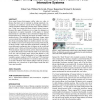Free Online Productivity Tools
i2Speak
i2Symbol
i2OCR
iTex2Img
iWeb2Print
iWeb2Shot
i2Type
iPdf2Split
iPdf2Merge
i2Bopomofo
i2Arabic
i2Style
i2Image
i2PDF
iLatex2Rtf
Sci2ools
CORR
2016
Springer
2016
Springer
Augur: Mining Human Behaviors from Fiction to Power Interactive Systems
From smart homes that prepare coffee when we wake, to phones that know not to interrupt us during important conversations, our collective visions of HCI imagine a future in which computers understand a broad range of human behaviors. Today our systems fall short of these visions, however, because this range of behaviors is too large for designers or programmers to capture manually. In this paper, we instead demonstrate it is possible to mine a broad knowledge base of human behavior by analyzing more than one billion words of modern fiction. Our resulting knowledge base, Augur, trains vector models that can predict many thousands of user activities from surrounding objects in modern contexts: for example, whether a user may be eating food, meeting with a friend, or taking a selfie. Augur uses these predictions to identify actions that people commonly take on objects in the world and estimate a user’s future activities given their current situation. We demonstrate Augur-powered, act...
Related Content
| Added | 01 Apr 2016 |
| Updated | 01 Apr 2016 |
| Type | Journal |
| Year | 2016 |
| Where | CORR |
| Authors | Ethan Fast, William McGrath, Pranav Rajpurkar, Michael S. Bernstein |
Comments (0)

